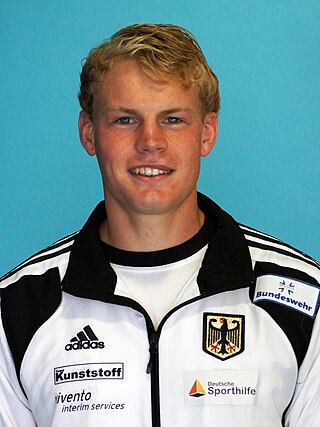
The 1920 Summer Olympics, officially known as the Games of the VII Olympiad and commonly known as Antwerp 1920, were an international multi-sport event held in 1920 in Antwerp, Belgium.

Water polo has been part of the Summer Olympics program since the second games, in 1900. A women's water polo tournament was introduced for the 2000 Summer Olympics. Hungary has been the most successful country in men's tournament, while the United States is the only team to win multiple times at the women's tournament since its introduction. Italy was the first to win both the men's and women's water polo tournaments.

Athletes from East Germany and West Germany competed together as the United Team of Germany for the last time at the 1964 Summer Olympics in Tokyo, Japan. 337 competitors, 275 men and 62 women, took part in 159 events in 19 sports.

Switzerland competed at the 1920 Summer Olympics in Antwerp, Belgium. 77 competitors, all men, took part in 45 events in 13 sports.

Germany competed at the 1952 Summer Olympics in Helsinki, Finland. 205 competitors, 173 men and 32 women, took part in 123 events in 18 sports.

Germany competed at the 1928 Summer Olympics in Amsterdam, Netherlands. Germany returned to the Olympic Games after not being invited to both the 1920 and 1924 Games due to its role in World War I. Despite a total absence of 16 years since 1912, German athletes were ranked 2nd. 295 competitors, 260 men and 35 women, took part in 95 events in 16 sports.

Germany competed at the 1912 Summer Olympics in Stockholm, Sweden. 185 competitors, 180 men and 5 women, took part in 69 events in 14 sports. Due to the political fallout from World War I, this was the country's last appearance until 1928.

Finland first participated at the Olympic Games in 1908 and has sent athletes to compete in every Summer Olympic Games and every Winter Olympic Games since then. Finland was also the host nation for the 1952 Summer Olympics in Helsinki. Finnish athletes have won a total of 305 medals at the Summer Games, mostly in athletics and wrestling. Finland has also won 175 medals at the Winter Games, mostly in nordic skiing events.
Otto Liebing was a German rower who competed for the German Empire in the 1912 Summer Olympics, as bowman. The German team won the bronze medal in the eight.
Max Bröske was a German rower who competed for the German Empire in the 1912 Summer Olympics. The German team won the bronze medal in the eight.
Wilhelm "Willi" Bartholomae was a German rower who competed for the German Empire in the 1912 Summer Olympics. The German team won the bronze medal in the eight.
Friedrich Carl Bartholomae was a German rower who competed for the German Empire in the 1912 Summer Olympics. The German team won the bronze medal in the eight. He was killed in action during World War I.
Bruno Werner Karl Dehn was a German rower who competed for the German Empire in the 1912 Summer Olympics. The German team won the bronze medal in the eight.
Rudolf Reichelt was a German rower who competed for the German Empire in the 1912 Summer Olympics. The German team won the bronze medal in the eight.
Hans Matthiae was a Germany rower who competed in the 1912 Summer Olympics. He was the strokeman of the German boat, which won the bronze medal in the eights.
Kurt Albert Georg Runge was a German rower who competed for the German Empire in the 1912 Summer Olympics, as the coxswain. The German team won the bronze medal in the eight.

Marcus Gross is a German canoeist who has competed since the late 2000s.

Maximilian Meyer is a German professional footballer who plays as an attacking midfielder for Cypriot First Division club APOEL. He has represented the Germany national team.
This article lists various water polo records and statistics in relation to the Germany men's national water polo team, the United Team of Germany men's national water polo team, and the West Germany men's national water polo team at the Summer Olympics.









